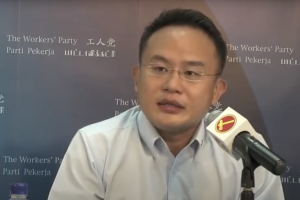All images by Stephanie Lee for RICE Media
The target is a spouse suspected of cheating. He scans his surroundings to check whether anyone is watching. There isn’t—or so he thinks. It’s hard to make anyone out past a 10-metre radius when it’s dark.
He approaches a designated meeting spot in the park. His partner is already there, waiting nervously for him to arrive. They’re about to head off to a hotel for a night of extramarital congress.
But the target concludes wrongly. A private investigator, also known as an operator, has been leopard-crawling through a grass patch nearby. The operator must stay as close to the ground as possible to avoid detection while getting a better view of the couple.
The operator notes the meeting point, how long the couple met, and where they go after their tryst. The couple, their attention locked onto each other, are completely oblivious to his observations.
Equally oblivious are Singaporeans to the true work of local private investigators—secrecy is their bread-and-butter, after all. That was until private investigation firm Ranger Investigation & Security Services showed up on TikTok.
Their explainer videos detail the firm’s services and what Singapore’s private investigators do in the shadows. Yong Yi, who is in his mid-40s and is a partner at the firm, is a staple in their TikTok clips. He’s hard to miss. In the videos, he wears a black surgical mask to conceal his identity.
He wears the same black surgical mask when he speaks to RICE. Broadcasting your private investigation work on a platform designed for maximum exposure seems counterintuitive. But Yong Yi doesn’t think so.
“Going onto TikTok has been on my mind for a long time. No one really knows what private investigators do. I just wanted to show them that it’s like any other profession. We help people as well.”
Yong Yi is initially guarded when we first meet, careful not to reveal any information that shouldn’t be shared. Give too much information away and he could risk his prized possession: his anonymity.
Privacy is an utmost priority for him. That being said, having to be on guard constantly and keep secrets for a living surely must have a psychological toll on Yong Yi.
A Private Eye’s Raison D’etre
Long, irregular hours compound the stress Yong Yi is under. As if the job wasn’t demanding enough, private investigators must remain professional when facing human nature’s ugliness.
The operators refer to the people under investigation as ‘targets’. Their sense of detachment accompanies their stoic appearance. Clients, often driven to the edge to require investigative services, are emotional when they approach Yong Yi and his team.
“We have to be rational. It helps us to think clearly and helps the client in the long run.” However, a manufactured emotional distance is challenging, even for the most seasoned private investigators.
When asked whether he’s been personally affected by a case, he lets down his walls. Yong Yi responds with a resounding ‘yes’.
“We helped a parent find their long lost child. The pair lost touch about five to 10 years ago. The parent hired us to get information on their child. They urgently needed to reconnect because of age and health reasons.”
“We succeeded. It was heart-wrenching to see our client break down. The information is not tangible, but they hold onto it, knowing they have the chance to reconnect with their loved ones.”
Private investigators work on more than just cases of cheating spouses—although Yong Yi admits that about 50 percent of his firm’s cases pertain to infidelity. Law firms and businesses seeking additional information about individuals or companies form the other half of Ranger Investigation & Security’s workload.
“In litigation, law firms need evidence for their cases. The evidence might not be readily available. That’s where private investigators can help. We gather information on people that can help as evidence in court cases.”
He estimates that his firm receives about five to 20 new clients monthly—the firm charges hourly, depending on the type of work they’re conducting.
With good intelligence, an investigation takes as short as four hours to complete. On the other end of the spectrum, cases can span as long as close to a decade.
“There are cases where we’ve monitored the spouse for nine years. It’s activity monitoring. We check every few weeks or months, depending on the client’s wants. So we either prove something is happening or disprove it.”
Whatever the case, private investigation, for Yong Yi, helps people and businesses get out of difficult situations—a cheating spouse who denies wrongdoing or a business owner who doesn’t have the means to uncover his employees’ wrongdoings. Yong Yi derives job satisfaction from furnishing his clients with cold, hard evidence.
The Life and Times of a Private Investigator
That satisfaction has kept him in the business for more than 10 years. Yong Yi is the third-generation owner of the firm, which was started by a former Criminal Investigation Department police officer in 1986.
Yong Yi’s parents ran a security agency which was in the same building as Ranger Investigation & Security. When the owner of the private investigation firm retired in 2003, he passed the business over to Yong Yi’s parents. After 10 years at the helm, Yong Yi’s parents handed the reins of the private eye outfit to Yong Yi.
It’s now a family business—Yong Yi’s wife is also a private investigator at the same firm.
“I was from the chemicals industry. My family asked me to join the business. I gave it a lot of thought because you compare what you’re giving up to what you’re getting yourself into. I fell in love with helping people and there was no turning back.”
And he has undoubtedly gotten himself into sticky situations since. He left a stable chemical industry job to find himself in the thick of the action.
On any given day, Yong Yi crawls through the grass to observe targets, searches nooks and crannies to detect tracking devices and racks his brain to outsmart targets to avoid being detected.
However, Yong Yi notes that caution is never thrown to the wind, regardless of how exciting investigative work becomes.
And no matter how exciting the bulk of your job is, no business can escape the drudgery of paperwork and meetings. The thrill of living an undercover life is well-balanced with the mundane demands of any other office in Singapore.
“An operator is usually out in the field while client associates meet with clients. Regardless of your role, everyone writes reports, attends training conferences, and has meetings to devise solutions to outsmart targets.”
How to Be a Private Investigator in Singapore
Even the most action-packed jobs, like private investigation, sound less exciting when administrative matters come into the mix. The road to being a private investigator sounds equally arduous.
An aspiring private eye must pass a background check before obtaining a private investigator licence from the Singapore Police Force. Your first steps into the cloak-and-dagger world don’t end there.
“There are also training requirements. You have to enrol in a basic training course on information collection and pass the assessment to start working as a private investigator.”
The course teaches the legal boundaries of private investigation. The work of a private eye differs from what we make it out to be. Private investigators in Singapore cannot break the law for their clients—breaking into private premises to uncover information is more fiction than reality.
Spy cameras can only be used under specific circumstances. According to Singapore Legal Advice, these devices are usually only trained at “public places or places owned by the client”.
The private investigator risks finding themselves on the wrong side of the law when spy cameras are used to insult a woman’s modesty or obtain obscene material. Investigating high-profile figures (such as politicians and their families) or conducting surveillance in protected places requires approval.
Knowing your legal limits and passing the course is only half the battle. The rest of the job consists of acquiring clients and sussing out their intentions.
“We can reject clients if we find that they’re up to no good.”
Yong Yi estimates that about 100 private investigation firms in Singapore compete for business. Due to the nature of the work, reliability is crucial—clients often compare prices and check on a private investigation firm’s repute.
That reliability is hard-won. It cannot be taught in a classroom.
An Empathetic Private Investigator
“Most of the things you learn, you learn out in the field and on the job,” Yong Yi explains, adjusting his surgical mask. One slip and it could reveal his identity.
His secrecy, a prized asset, must be kept at all costs. If private investigation demands such invisibility, can a private investigator ever lead a life of healthy relationships outside their job?
After all, spending at least eight hours daily being suspicious of others could breed cynicism and paranoia. More so when the work involves uncovering unflattering information about what Singaporeans do privately.
It’s only natural to assume that constantly being exposed to the “not-so-nice” side of human nature shapes Yong Yi’s worldview—a view of doubt, scepticism, and uncertainty.
The harrowing nature of some jobs only adds to the stress.
“We have to outsmart the targets. One of the craziest things we’ve done is that we crept up to a target. We were only a metre away.”
A clean separation between life and work is not impossible, but it remains challenging for most people. We bring the parts of ourselves we’ve created in the office and return home with them when the day ends. It’s only natural to assume that Yong Yi, the private eye, brings a part of his work back home with him.
“When people come to us, it’s usually bad news. We get to see a different side of people, but we understand this is a reality of life. People make mistakes; they do things they will regret. Sometimes, they don’t realise the pain they’re causing.”
“I guess you could say we’ve become more empathetic as people. We’ve taken that into our private lives.”
He doesn’t reveal anything further about his background. “We’re more cautious about avoiding the same mistakes others have made,” he adds.
To Help People
Understandably, most of us would shudder at the idea of being watched from the shadows or a grass patch not too far away, in Yong Yi’s case. Especially when we recognise that someone else has paid to uncover information about us.
Privacy, however, takes a backseat when it’s essential to intervene in someone’s private life. “We had a client who couldn’t sleep or eat because of a cheating spouse. The spouse gaslighted our client and denied it.”
“After we gathered evidence to confirm our client’s beliefs, our client was able to get back on her feet and rebuild her life. It was an indescribable sense of satisfaction.”
Not all private investigation work profoundly impacts clients—sometimes, a private investigator’s clients are businesses engaged in court battles. At the very least, Yong Yi wants to show that his work has the potential to help people.
No one wants to reach a point in their life where private investigation work becomes necessary. But if anyone ever comes to that point, you can rest easy knowing Yong Yi and his black surgical mask will be there to help.
Yong Yi bids the RICE team farewell and fades into the shadows. We don’t know where he’s off to next. But if you’re ever in a park at night and see something moving slowly through the grass, it might just be him, mask and all.






